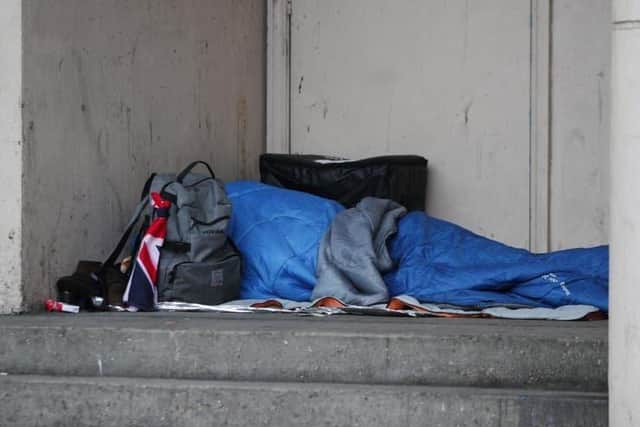Countryside battling ‘hidden homelessness’ crisis as rough sleepers tell of muggings, tents set on fire and digging trenches in the snow
A year-long study has exposed a surge in rural rough sleeping since the pandemic that has been worsened by the cost-of-living crisis.
However, it is feared that the true scale of the crisis is likely to be far higher than the official statistics, which say that rough sleeping in rural areas shot up 24 per cent in just one year.
Advertisement
Hide AdAdvertisement
Hide AdThe study, which included a survey of 157 frontline support workers, service providers, non-governmental organisations and shelters, found an overwhelming majority thought rural homelessness was a serious problem that was getting worse.


Key findings reveal that, 91 per cent of respondents in rural areas have seen homelessness increase in the past five years; 83 per cent said their job had become harder in the past five years and 81 per cent believe that rough sleeping is experienced differently in rural areas compared to urban areas.
The study - by academics at the University of Kent and the University of Southampton, on behalf of a coalition of rural charities, rural organisations (including the Rural Services Network) and housing associations - shows rural areas being paid a fraction of what they need to tackle homelessness in their communities.
Overall, rural local authorities are receiving 65 per cent less in funding per capita through the Homelessness Prevention Grant than urban areas, who are themselves chronically underfunded. The sharp discrepancy in financial aid, discovered in statistics released by the Department for Levelling Up, Housing and Communities, shows urban local authorities were paid £7.15, compared to just £2.50 paid to rural local authorities when calculated on a like-for-like basis.
Advertisement
Hide AdAdvertisement
Hide AdInterviews with more than 40 people, including people who sleep rough and outreach workers in four rural locations, paint a striking picture of isolation and resilience.
People who experience homelessness in rural areas often sleep rough in farmland or woodland, making them much harder for outreach workers to find and support, and putting their life and health in jeopardy.
Real life stories shared with the researchers included people digging trenches in the snow to sleep, going several days without food, being spat on, their tents set on fire, and muggings that resulted in brain injuries and teeth being knocked out.
The study found that isolation also made the problem far worse for those facing homelessness in rural areas, where limited transport options and the absence of support placed them at greater risk. Those with physical or mental health needs were found to be most vulnerable
Advertisement
Hide AdAdvertisement
Hide AdMartin Collett, chief executive of English Rural and co-chair of the research project, said: "This research shines a spotlight on a growing rural crisis hidden in plain sight. You see here the brutal reality beyond the insufficient official statistics. People who have no chance of affording a basic standard of living through no fault of their own.
"You don’t tend to see people sleeping rough in rural areas – but they’re there, normally hidden in agricultural buildings, outhouses, sleeping rough on farmland or condemned to an insecure life of sofa surfing. Because funding is so inadequate, many people are moving to urban centres for much needed support. It is in all our interests to fix this crisis.
“Rural homelessness is a significant problem, and a lack of support and funding for affordable homes and services in these areas puts vulnerable households at a distinct disadvantage. The findings of this research should drive a step change in our approach to the issue. Local and national leaders must come together to say clearly that ‘rural homelessness counts.”
The coalition behind the research has called for the following measures to be implemented which would include all future homelessness and rough sleeping strategies to consider the needs of rural communities and ‘at risk’ residents living in them; improved processes for better counting and identifying instances of rural homelessness; delivering new homelessness support services in rural communities that address mental health and social and physical isolation, and dedicated investment to fund much needed rural social housing and increasing funding through the welfare system to cover the cost of rent.
